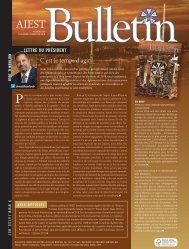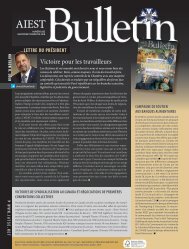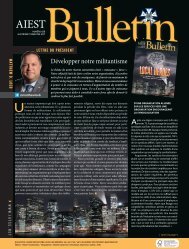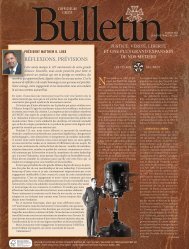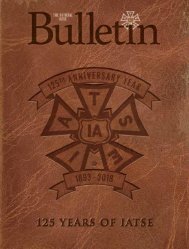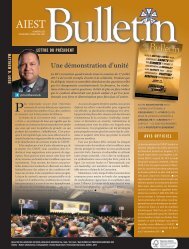IATSE_3rd2017_web
You also want an ePaper? Increase the reach of your titles
YUMPU automatically turns print PDFs into web optimized ePapers that Google loves.
STAGECRAFT DEPARTMENT<br />
In 2013, the Stagecraft Department<br />
conducted a survey of all stage Locals in<br />
the Alliance to identify common challenges.<br />
Locals reported that their leading<br />
concerns were non-union competition<br />
(particularly from labor contractors),<br />
lack of organizing resources, the use of<br />
“rate cards” in lieu of comprehensive collective<br />
bargaining agreements, disparate<br />
relationships with multiregional or national<br />
employers, and the acute effects of<br />
various challenges for our smaller Locals.<br />
Consequently, these matters have<br />
greatly informed the administration and<br />
activities of the Stagecraft Department<br />
during the last four years. In that time,<br />
the Department handled 113 assignments.<br />
These included 59 assignments to<br />
assist Locals in contract negotiations, 39<br />
assignments to assist Locals in organizing<br />
drives, and 23 assignments to assist Locals<br />
administratively (with grievance processing,<br />
contract administration, revising<br />
Constitutions, and membership issues).<br />
The following describes the results of<br />
the <strong>IATSE</strong>’s focused approach to these<br />
matters and challenges that persist.<br />
International Contracts<br />
Where appropriate, the IA has<br />
pursued International contracts with<br />
employers operating across multiple<br />
local union jurisdictions. This allows us<br />
to ensure all Locals’ jurisdiction is protected.<br />
Standardized minimum working<br />
conditions are followed and local wage<br />
and benefit standards are imposed. This<br />
approach continues to benefit all stage<br />
Locals. The first and most renowned International<br />
contract is the Pink Contract<br />
covering traveling stagecraft workers.<br />
In March, 2016 the Pink Contract was<br />
renegotiated with The Broadway League<br />
and Disney Theatrical Productions. The<br />
successor contract has a three and onehalf<br />
year term lasting until June 30, 2019.<br />
Contract minimum wages increase each<br />
year in all categories on all tiers (i.e., full,<br />
modified, and SET). Employees’ per diem<br />
payments will increase in each year of the<br />
agreement. Health benefit coverage will<br />
remain the same with no co-payments<br />
by participants. All cost increases associated<br />
with healthcare will be paid by the<br />
employers. The Pink Contract now also<br />
requires employers to provide additional<br />
housing options at each tour stop. Meal<br />
breaks are more plainly defined and<br />
certain travel reimbursements have increased.<br />
Importantly, employees working<br />
on tours that are transitioning between<br />
tiers (Full to Modified, or Full to SET,<br />
or Modified to SET) will have more assurances<br />
over their subsequent pay. In<br />
another notable breakthrough, the new<br />
Pink Contract eliminates eight hours of<br />
work beyond performances that was formerly<br />
required before additional compensation<br />
is required. The new contract<br />
also increased the number of performances<br />
that could be done on a SET tour<br />
within an eight-week period.<br />
Following implementation of the<br />
new Pink Contract, the IA has continued<br />
to monitor overage payments on modified<br />
and SET tours. We regularly conduct<br />
audits to ensure compliance with contractual<br />
overage requirements.<br />
The Non-League Pink Contract<br />
covers five touring companies—NETworks,<br />
Troika, Big League, Phoenix and<br />
Work Light. The first Non-League Pink<br />
Contract, which covered all tours produced<br />
by these companies expired at the<br />
end of June 2016. Separate terms cover<br />
different touring tiers—these are embodied<br />
in the “L” Touring Agreement and the<br />
Bus and Truck Touring Agreement. The<br />
“L” agreement is applicable to tours comparable<br />
to those under the League Pink<br />
Contract. The Bus and Truck contract<br />
covers smaller tours that typically play<br />
split weeks and one night stops.<br />
The successor “L” Touring Agreement<br />
was renewed on terms largely<br />
matching those in the League Pink<br />
Contract. Renewal negotiations for the<br />
Bus and Truck contract were more difficult.<br />
The IA successfully introduced<br />
improved conditions and benefits for<br />
these workers, who often work challenging<br />
schedules on tour. The new contract<br />
includes enhanced wages, per diem, and<br />
travel expenses. It offers more opportunities<br />
for additional earnings and for the<br />
first time, these crews now also receive<br />
annuity retirement benefits.<br />
The International also recently renegotiated<br />
a successor contract with Spectra<br />
Venue Management (formerly known as<br />
Global Spectrum, Inc.) The Spectra contract,<br />
which expired in February 2016,<br />
currently covers thirty-four <strong>IATSE</strong> Locals.<br />
The International contract establishes<br />
minimum terms and each local union has<br />
an addendum establishing its area wages<br />
and benefits (and any other conditions<br />
superior to those contained in the central<br />
contract). The IA successfully negotiated<br />
wage increases of three percent per year<br />
for all covered work. Several local unions<br />
also submitted proposals concerning<br />
their respective venues. Largely, these<br />
issues were resolved.<br />
The Spectra contract is perhaps our<br />
most successful International stagecraft<br />
42 OFFICIAL BULLETIN






